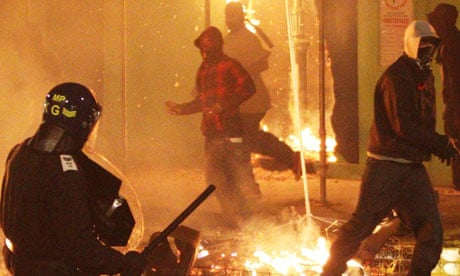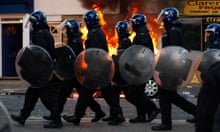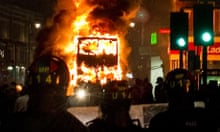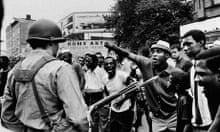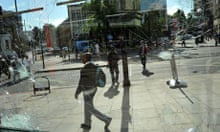The causes and consequences of the English riots last month, the most serious bout of civil unrest in a generation, will be examined in a study by the Guardian and the London School of Economics.
Researchers will interview hundreds of people who were involved, in the first empirical study into the widespread rioting and looting.
As well as surveys of those who took part in the disorder, the research will include interviews with residents, police and the judiciary, and an advanced analysis of more than 2.5m riot-related Twitter messages.
The study – Reading the Riots – is supported by the Joseph Rowntree Foundation and the Open Society Foundations. The project, announced on the eve of the one-month anniversary of the outbreak of trouble in Tottenham, north London, will seek to better understand why riots then spread to other parts of the capital and cities across England.
Four consecutive nights of looting and arson in August left five people dead and more than 2,000 suspects arrested. Police anticipate that investigations to identify perpetrators of the disorder will last several years.
Reading the Riots is modelled on an acclaimed survey conducted in the aftermath of the Detroit riots in 1967. The findings of that study, the result of a groundbreaking collaboration between the Detroit Free Press newspaper and Michigan's Institute for Social Research, challenged prevailing assumptions about the cause of the unrest.
Prof Phil Meyer, who co-ordinated the Detroit study more than four decades ago, will advise the research into the English riots. The LSE's involvement will be led by Prof Tim Newburn, head of the university's social policy department, which has the highest possible research rating in the UK.
Newburn, a former president of the British Society of Criminology and an advisor to the Metropolitan police and Home Office, said: "There is an urgent need for some rigorous social research which will look, without prejudice, at the causes and the consequences of the recent riots.
"Crucially, it is vital that we speak with those involved in the disturbances and those affected by them to try to understand any lessons for public policy."
Previous incidents of serious civil disorder in England, such as the Oldham riots in 2001 and the Brixton riots in 1981, led to government-commissioned inquiries and reviews. Lord Scarman's public inquiry into the Brixton disturbances, which were followed by further rioting in Toxteth, Liverpool, in the same year, proved a watershed moment for social policy, warning that urgent action was required to tackle racial disadvantage and distrust in the police.
The government has resisted calls for a public inquiry into the August riots, which flared in most of London's boroughs and spread to parts of Birmingham, Manchester, Nottingham, Liverpool and Gloucester.
There have been no attempts to systematically speak to those involved in the riots. A victims panel announced by the deputy prime minister, Nick Clegg, will take evidence from residents in areas where there was rioting and report preliminary findings in November. The four-person panel will be chaired by Darra Singh, chief executive of JobCentre Plus.
Reading the Riots will bring together a team of leading academics and experts and combine quantitative and qualitattive research methods. At the heart of the project are two unique databases compiled by the Guardian over the last month.
The first is a database of more than 1,100 defendants who have appeared in court charged with riot-related offences. The list, compiled with the assistance of the Ministry of Justice, consists of more than 70% of those who have appeared in magistrate and crown courts. Many will be given the opportunity to take part in the research study in the coming weeks.
The second database contains 2.5m riot-related tweets. Executives at Twitter's headquarters in California authorised the collation of tweets, pooled from hashtags relating to the riots and their aftermath, so they could form part of the study. A spokeman for the company said: "Twitter provided publicly available information that is accessible to researchers and others via its API."
Julia Unwin, chief executive of the Joseph Rowntree Foundation, said: "The JRF believes that solid evidence has to be the driver for good policy. So, as policymakers develop responses to the riots, the need for solid evidence on the causes of the riots is crucial. Currently none exists.
"The qualitatitve and quantitative data the Guardian has in its unique possession is invaluable. The rigorous analysis the LSE will carry out on this evidence will be vital to understanding why the riots occurred. It is for this reason why JRF is involved in this partnership: we want policy responses to be based on evidence, not on conjecture."
Alan Rusbridger, the Guardian News and Media editor-in-chief, said: "The Guardian continues to make great strides in the field of data journalism, and the volume of information and statistics we have gathered since the riots erupted this time last month is vast. As a newspaper we can draw objective conclusions from this data, but working with LSE will enable us to slot these facts into the wider social picture and present a more comprehensive look at what caused these events to unfold."
